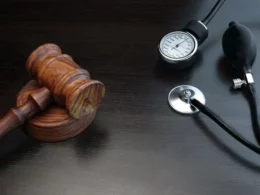Medical negligence is a term that refers to the failure of a healthcare provider to provide the appropriate standard of care, which results in harm or injury to the patient. It is a legal concept that is governed by health law, which provides a framework for patients to seek compensation for damages caused by medical malpractice.
Health law is a body of law that governs the healthcare industry, including medical negligence. It is designed to protect the rights of patients and ensure that healthcare providers are held accountable for their actions. Health law covers a wide range of issues, including medical malpractice, patient rights, and healthcare regulations.
So what is medical negligence in health law? Medical negligence in health law is the failure of a medical professional to provide the expected level of care to a patient, which can cause harm or injury.
This can happen when a medical professional departs from the recognized medical standard of care, and it can involve acts of omission or commission. The duty of care that medical professionals have towards their patients is a crucial factor in determining whether medical negligence has taken place.
Medical Negligence
Medical negligence, also known as medical malpractice, refers to the failure of a healthcare provider to provide the appropriate medical treatment that meets the standard of care. It is an act or omission by a medical professional that causes harm or injury to a patient.
To prove medical negligence, you must establish four elements: duty, breach of duty, causation, and damages.
Duty refers to the legal obligation of a healthcare provider to provide medical care to a patient.
Breach of duty occurs when the healthcare provider fails to meet the standard of care that a reasonably prudent healthcare provider would have provided in similar circumstances.
Causation means that the breach of duty caused the harm or injury to the patient.
Damages refer to the harm or injury suffered by the patient as a result of the breach of duty.
The standard of care refers to the level of care that a reasonably prudent healthcare provider would have provided in similar circumstances. It is determined by taking into account the medical knowledge, skills, and judgment that a healthcare provider should have had at the time of providing medical treatment.
Note that medical negligence is not the same as an unfavorable outcome. Not every medical treatment or procedure will have a successful outcome. However, if the healthcare provider provided the appropriate medical treatment that meets the standard of care, and the patient still suffered an unfavorable outcome, it does not constitute medical negligence.
Overall, medical negligence is a serious issue in the healthcare industry that can result in harm or injury to patients. To establish medical negligence, you must prove that the healthcare provider breached their duty of care and that the breach caused harm or injury to the patient. The standard of care is an important factor in determining whether the healthcare provider breached their duty of care.
Types of Medical Negligence
Medical negligence can occur in various forms and can lead to severe consequences for the patient. Here are some of the most common types of medical negligence:
Misdiagnosis
Misdiagnosis occurs when a medical professional fails to diagnose a patient’s condition correctly. This can lead to the patient receiving the wrong treatment or no treatment at all, which can cause a delay in recovery or even death. Misdiagnosis can happen due to various reasons, such as inadequate testing, failure to recognize symptoms, or misinterpretation of test results.
Delayed Diagnosis
Delayed diagnosis is when a medical professional fails to diagnose a patient’s condition promptly. This can lead to the patient’s condition worsening, and the treatment may not be as effective as it would have been if diagnosed earlier. A delay in diagnosis can happen due to various reasons, such as inadequate testing, failure to recognize symptoms, or misinterpretation of test results.
Surgical Errors
Surgical errors occur when a medical professional makes a mistake during surgery. This can include errors such as operating on the wrong body part, leaving surgical instruments inside the patient’s body, or damaging nearby organs or tissues. Surgical errors can lead to severe consequences, including infections, bleeding, or even death.
Medication Errors
Medication errors occur when a medical professional prescribes the wrong medication or the wrong dosage. This can lead to adverse side effects, allergic reactions, or even death. Medication errors can happen due to various reasons, such as misreading prescriptions, prescribing the wrong medication, or incorrect dosages.
Failure to Diagnose
Failure to diagnose occurs when a medical professional fails to diagnose a patient’s condition at all. This can lead to the patient’s condition worsening, and the treatment may not be as effective as it would have been if diagnosed earlier. A failure to diagnose can happen due to various reasons, such as inadequate testing, failure to recognize symptoms, or misinterpretation of test results.
In summary, medical negligence can occur in various forms, including misdiagnosis, delayed diagnosis, surgical errors, medication errors, and failure to diagnose. It is essential to consult with a qualified medical professional if you suspect that you have been a victim of medical negligence.
Healthcare Professionals and Negligence
Healthcare professionals have a duty of care towards their patients. Negligence occurs when a healthcare professional fails to fulfill this duty of care. If you believe that you have been a victim of medical negligence, you may be entitled to compensation. Here are some examples of healthcare professionals who may be held liable for medical negligence:
Doctors and Surgeons
Doctors and surgeons have a duty to provide their patients with the best possible care. If they fail to do so, they may be found guilty of medical negligence. Some examples of medical negligence by doctors and surgeons include misdiagnosis, failure to diagnose, surgical errors, and prescribing the wrong medication.
Nurses and Healthcare Providers
Nurses and healthcare providers are responsible for providing care to their patients. If they fail to provide adequate care, they may be found guilty of medical negligence. Some examples of medical negligence by nurses and healthcare providers include administering the wrong medication, failing to monitor a patient’s condition, and failing to provide adequate wound care.
Dentists and Chiropractors
Dentists and chiropractors are also healthcare professionals who may be held liable for medical negligence. Dentists may be found guilty of medical negligence if they fail to diagnose oral diseases or perform procedures improperly. Chiropractors may be found guilty of medical negligence if they perform spinal manipulations improperly.
Lab Technicians
Lab technicians are responsible for performing tests and analyzing samples. If they fail to perform these tasks properly, they may be found guilty of medical negligence. Some examples of medical negligence by lab technicians include mislabeling samples, failing to follow proper testing procedures, and misinterpreting test results.
Healthcare professionals have a duty of care towards their patients. If they fail to fulfill this duty of care, they may be found guilty of medical negligence. If you believe that you have been a victim of medical negligence, you should consult with a qualified attorney.
Legal Aspects of Medical Negligence
When it comes to medical negligence, there are several legal aspects that need to be considered. In this section, we will discuss the key legal elements that make up a medical malpractice claim.
Proving Medical Negligence
To have a valid medical malpractice claim, you must be able to prove that medical negligence occurred. This means that a healthcare provider failed to meet the standard of care that was owed to you as a patient. To do this, you will need to show that:
- The healthcare provider had a legal duty to provide care
- The healthcare provider breached that duty by failing to provide the appropriate standard of care
- The breach of duty caused harm to you as the patient.
Legal Duty and Standard of Care
Healthcare providers have a legal duty to provide care that meets the appropriate standard. This means that they must provide care that is in line with what a reasonable and prudent healthcare provider would do in similar circumstances. If a healthcare provider fails to meet this standard, they may be considered negligent.
Res Ipsa Loquitor
In some cases, it may be difficult to prove that medical negligence occurred. In these cases, the legal principle of res ipsa loquitor may be used. This principle means that if an injury or harm occurs to a patient during a medical procedure, and it is clear that the injury would not have occurred if the healthcare provider had not been negligent, then the healthcare provider may be held liable for the harm.
Causation and Harm
To have a valid personal injury case, you must be able to show that the healthcare provider’s negligence caused harm to you. This means that you must be able to show that the harm you suffered was a direct result of the healthcare provider’s negligence.
In summary, medical negligence is a complex legal issue that requires a thorough understanding of the legal terms and concepts involved. If you believe that you have been the victim of medical negligence, it is important to seek the advice of a legal professional who can help you navigate the court of law and determine whether you have a valid claim for harm or damage caused to you.
Compensation and Damages in Medical Negligence
If you have been a victim of medical negligence, you have the right to pursue compensation for your injuries and damages. Compensation is the amount of money paid to you by the negligent party or their insurance company to cover your losses. These losses may include medical expenses, lost wages, pain and suffering, and other damages resulting from the negligence.
Damages in medical negligence cases can be classified into two categories: economic and non-economic. Economic damages are quantifiable losses such as medical bills, lost wages, and future medical expenses. Non-economic damages are intangible losses such as pain and suffering, emotional distress, and loss of enjoyment of life.
The amount of compensation you can receive for your injuries and damages will depend on various factors such as the severity of your injuries, the cost of medical treatment, and the impact of the injury on your life. In some cases, the court may also award punitive damages, which are intended to punish the negligent party for their actions.
It is important to note that pursuing compensation for medical negligence can be a complex and challenging process. You may need to hire an experienced attorney to help you navigate the legal system and ensure that you receive the compensation you deserve.
In addition, some states have laws that limit the amount of compensation you can receive in a medical negligence case. These laws may include caps on non-economic damages or limits on the total amount of compensation that can be awarded in a case.
Overall, if you have been injured due to medical negligence, it is important to understand your legal rights and options for pursuing compensation. By working with an experienced attorney and understanding the types of damages available, you can ensure that you receive the compensation you need to recover from your injuries and move forward with your life.
Role of Medical Institutions
Medical institutions, such as hospitals, clinics, and healthcare institutions, play a crucial role in ensuring that medical care is provided in a safe and effective manner. These institutions are responsible for ensuring that their medical staff adheres to the highest standards of care and that patients receive appropriate treatment.
Hospitals and Clinics
Hospitals and clinics are responsible for providing medical care to patients and ensuring that their medical staff is properly trained and qualified to provide such care. They must also ensure that their facilities are properly equipped to handle medical emergencies and that appropriate protocols are in place to address any issues that may arise.
In cases of medical negligence, hospitals and clinics may be held liable for the actions of their medical staff. This is known as vicarious liability, and it means that the institution may be held responsible for the actions of its employees, even if those actions were not explicitly authorized.
Healthcare Institutions
Healthcare institutions, such as nursing homes and rehabilitation centers, are responsible for providing medical care to patients who require ongoing treatment and care. These institutions must ensure that their staff is properly trained and qualified to provide such care and that appropriate protocols are in place to address any issues that may arise.
In cases of medical negligence, healthcare institutions may also be held liable for the actions of their staff. This includes both medical and non-medical staff, such as nurses and aides, who may be responsible for providing care to patients.
Overall, medical institutions play a critical role in ensuring that patients receive appropriate medical care. They must adhere to the highest standards of care and take appropriate steps to address any issues that may arise. If you believe that you have been the victim of medical negligence, it is important to speak with an experienced healthcare attorney who can help you understand your legal rights and options.
Prevention and Protocols
To prevent medical negligence, healthcare providers must adhere to established guidelines, protocols, and standards. These protocols are designed to ensure that healthcare providers deliver quality care and reduce the risk of harm to patients.
The medical community has established various protocols and standards to ensure that healthcare providers deliver quality care. These protocols and standards cover a wide range of medical procedures and tests. For example, there are protocols for administering medication, performing surgery, and conducting diagnostic tests. These protocols are designed to ensure that healthcare providers follow a standard procedure that minimizes the risk of harm to patients.
To ensure that healthcare providers adhere to established protocols and standards, healthcare organizations must implement quality control measures. These measures include regular audits and assessments to evaluate the quality of care provided by healthcare providers. These assessments help identify areas where healthcare providers may be providing sub-standard care and provide an opportunity to improve the quality of care.
In addition to following established protocols and standards, healthcare providers must also make informed decisions regarding patient care. This requires healthcare providers to thoroughly evaluate a patient’s medical history and current condition before making a decision regarding treatment. Healthcare providers must also obtain informed consent from patients before performing any medical procedure. Informed consent requires healthcare providers to inform patients of the risks and benefits of a medical procedure and obtain the patient’s consent before proceeding.
Overall, healthcare providers must take a proactive approach to preventing medical negligence. This requires following established protocols and standards, implementing quality control measures, and making informed decisions regarding patient care. By doing so, healthcare providers can minimize the risk of harm to patients and ensure that they receive quality care.
Case Studies and Examples
When it comes to medical negligence, there are many examples that demonstrate how it can occur. Some of the most common examples of medical negligence include misdiagnosis, delayed diagnosis, surgical errors, medication errors, and birth injuries.
In fact, medical negligence is a leading cause of death in the United States, with estimates suggesting that as many as 250,000 people die each year as a result of medical errors. This underscores the importance of understanding what medical negligence is and how it can be prevented.
One area where medical negligence is particularly concerning is in cases of birth injuries. These can occur when medical professionals fail to properly monitor the mother and baby during labor and delivery, or when they make errors during the delivery process. Birth injuries can have lifelong consequences for the child and their family, and can include conditions like cerebral palsy, Erb’s palsy, and brachial plexus injuries.
In addition to birth injuries, medical negligence can also take the form of misconduct or deviation from accepted medical standards. For example, a doctor who fails to obtain informed consent from a patient before performing a procedure may be guilty of medical negligence. Similarly, a surgeon who performs a procedure on the wrong body part or leaves surgical instruments inside a patient may be guilty of medical negligence.
To illustrate the impact of medical negligence, here are a few examples of high-profile cases:
- In 2016, a jury awarded $72 million to the family of a woman who died from ovarian cancer after using Johnson & Johnson’s talcum powder for decades. The family alleged that the company knew about the risks associated with talcum powder but failed to warn consumers.
- In 2015, a jury awarded $25.2 million to a boy who suffered brain damage as a result of medical negligence during his birth. The boy’s mother had been in labor for more than 24 hours, but doctors failed to perform a timely c-section.
- In 2014, a jury awarded $140 million to a woman who suffered permanent brain damage as a result of medical negligence during surgery. The surgeon had left a surgical instrument inside the woman’s body, causing her to suffer a stroke.
These cases demonstrate the serious consequences that can result from medical negligence. It is important for medical professionals to take all necessary precautions to prevent such errors, and for patients to be aware of their rights and options in the event that they are harmed by medical negligence.
Conclusion
In conclusion, medical negligence is a serious issue in health law that can have significant consequences for victims, plaintiffs, defendants, caregivers, and victims of malpractice. It is important to understand what medical negligence is and how it differs from medical malpractice. Medical negligence is a legal concept that refers to a healthcare provider’s failure to provide the appropriate standard of care, while medical malpractice is a legal claim that arises from medical negligence.
If you are a victim of medical negligence, you may be entitled to compensation for your injuries, medical expenses, and other damages. It is important to consult with an experienced attorney who can help you navigate the legal system and protect your rights. Your attorney can help you gather evidence, build a strong case, and negotiate a fair settlement or represent you in court.
If you are a plaintiff in a medical negligence case, you have the burden of proving that the defendant breached the duty of care owed to you and that this breach caused your injuries. This can be a complex and challenging process, but with the help of an experienced attorney, you can increase your chances of success.
If you are a defendant in a medical negligence case, you have the right to defend yourself against the allegations and to argue that you provided the appropriate standard of care. It is important to work with an attorney who can help you build a strong defense and protect your rights.
If you are a caregiver, it is important to understand your legal obligations and to provide the appropriate standard of care to your patients. Failure to do so can result in legal liability and serious consequences.
If you are a victim of malpractice, it is important to seek help immediately and to take steps to protect your rights. This may include filing a complaint with the appropriate regulatory body, seeking legal advice, or taking other appropriate action.
In summary, medical negligence is a serious issue that can have significant consequences for all parties involved. It is important to understand your legal rights and obligations and to work with experienced professionals who can help you navigate the legal system and protect your interests.
YOU SHOULD ALSO READ:
- Medical Negligence vs Professional Misconduct: What Are The Differences?
- How Much Do Medical Malpractice Lawyers Charge?
- Medical Malpractice vs Professional Indemnity Insurance: The Key Differences
- Is RPOC Medical Negligence? Legal and Medical Implications
- Medical Malpractice vs Malfeasance: What are the Key Differences












